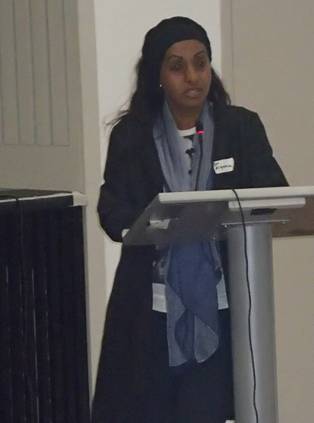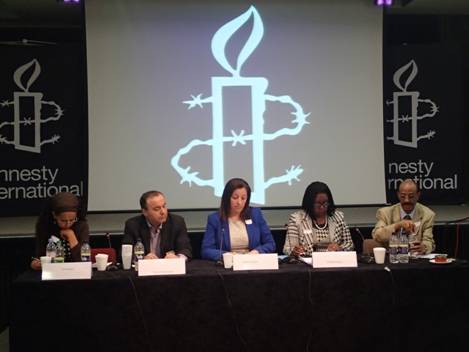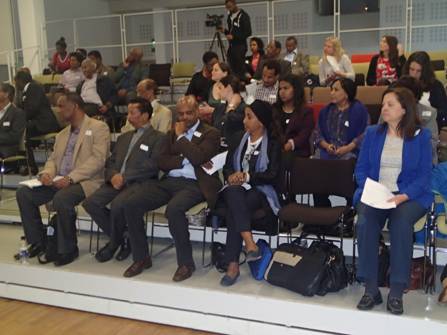Making a difference to the lives of refugees: the conference
Making a difference to the lives of refugees: the conference
A two day conference themed ‘Making a difference to the lives of refuges’ aimed at highlighting the situation of Eritrean refuges in the UK, in refugee camps in Ethiopia, Sudan and elsewhere and also highlighting the harrowing plight of Eritreans and other nationalities suffering at the hands of human traffickers was held at Amnesty International’s Human Rights Centre in London.

Dr Alganesh Fessaha highlighting the suffering of Eritrean and other victims of human trafficking
The conference was opened by lighting a candle and holding a-one-minute silence in honour and memory of our brothers and sisters going through dreadful humanitarian tragedies.
Solomon Yohannes presented summary of his research addressing the situation of Eritrean refugees and asylum seekers in the UK. The findings of the questionnaire based research indicated that Eritreans represent one of the most marginalized communities in the United Kingdom in terms of level of skills and education, status of mental and physical health, work and living conditions. Nevertheless, most of them work hard to improving their livelihoods by looking for jobs and being involved in different types of skills improvement courses and education programmes.
Dr Abdullahi Fido’s presentation on the mental health situation of refugees and asylum seekers of Somali origin showed that many members of the community show signs of mental illness associated with their displacement. Most of them do not understand the NHS system and those seeking diagnosis and treatment face challenges at different stages. Mr. Fazil Kawani, Executive Director of UK Refugee Council, underlined that the current changes in government policy and budget cuts were expected to severely hamper the services of the Council with dire consequences to refugees and asylum seekers. Presenting the status of mental health in the Eritrean community in the UK, Ahmed Suleiman pointed out that there was little information available regarding the issue. He called for a collaborative effort to conduct research in order to identify the main reasons and the extent behind the mental health problems among Eritrean refugees which is more often hidden and stigmatized.
 Elizabeth Mpyisi, from UNHCR presented how her organisation seeks to help refugees and asylum seekers as well as humanitarian and other assistance provided by UNHCR in refugee camps. She indicated that her organisation also monitors the standard of procedures to determine asylum applications in countries in the West, such as the UK. This prompted a question from Martin Plaut in the audience who raised the concern that the UNHCR needed to respond to the danger of Eritreans being forcibly returned to Eritrea from a number of European and other countries against the charter of the UNHCR. She indicated that UNHCR needed to do more on this issue and that she would try to get the UNHCR to address the issue of Eritreans and other nationals whose asylum seekers have been turned down after appeal and who are therefore unable to settle in the UK (and other host countries) but cannot be returned to their home countries.
Elizabeth Mpyisi, from UNHCR presented how her organisation seeks to help refugees and asylum seekers as well as humanitarian and other assistance provided by UNHCR in refugee camps. She indicated that her organisation also monitors the standard of procedures to determine asylum applications in countries in the West, such as the UK. This prompted a question from Martin Plaut in the audience who raised the concern that the UNHCR needed to respond to the danger of Eritreans being forcibly returned to Eritrea from a number of European and other countries against the charter of the UNHCR. She indicated that UNHCR needed to do more on this issue and that she would try to get the UNHCR to address the issue of Eritreans and other nationals whose asylum seekers have been turned down after appeal and who are therefore unable to settle in the UK (and other host countries) but cannot be returned to their home countries.
Dr. Alganesh Fessaha’s presentation was the main highlight of the conference. The presentation which featured some very unsettling pictures and sobering stories of citizens rescued from traffickers touched the hearts of everyone in the audience. She pointed out that trafficking involves intricate network of actors that are spread all the way between Asmara and other parts of Eritrea, Ethiopia, the Sudan, Egypt, Djibouti and Libya. There are even instances where cousins are sold by their Eritrean cousins. In Sinai, she said that there were constant mini-battles going on between rescuers and armed captors, often involving exchange of gun fire. One of the alarming observations was that the ramshackle houses where the victims are held and the shallow graves (sometimes they are literally dumped in refuse) and the splendid villas build from their blood are situated a few metres apart. She mentioned that although activities in the Sinai have started to subside, other routes, such as those in Yemen, Djibouti and Libya have intensified. Dr. Alganesh noted that her appeals to governments and NGOs and intergovernmental agencies to help stop the sufferings have been met with varying responses, from outright denial to false promises. Information on the exact locations of the compounds where the human traffickers live in indignant indulgence have and passed to the UN and embassies of Western Countries but they have not been followed by any action on the ground. She emphasised that the main challenge is lack of awareness in the international community and absence of coordination and concerted effort among those who try to help. She concluded her presentation by calling on Eritreans and others to unite and act together, and act urgently.
 The BBC’s Mike Thomson played a video and then talked about a report he had conducted with trafficked victim in the Sinai, Filmon. The piece had been widely covered and showed the situation of such victims and the ways in which their kidnappers solicit ransom from their families in Eritrea or the Diaspora, often by torturing them whilst they are desperately speaking to relatives by phone. These human traffickers show complete disregard for other human beings’ lives. Responding to the question why the human trafficking issue has been receiving such little coverage in western media, he reminded the audience that media people are often very busy and are often asked to present widely diverse stories with very short shelf lives. He assured the audience that if human rights activists and campaigners continue to be persistent and assertive in approaching the media about this story they will increase the amount of coverage. He recommended that activists need to have the evidence to hand, to develop concrete and fully researched examples of cases that will make it easier for news teams to cover. They need to build up their media contacts and then continue to badger them until they can convince their editors and other decision-makers of the importance of covering the appalling stories of Eritreans in the Sinai.
The BBC’s Mike Thomson played a video and then talked about a report he had conducted with trafficked victim in the Sinai, Filmon. The piece had been widely covered and showed the situation of such victims and the ways in which their kidnappers solicit ransom from their families in Eritrea or the Diaspora, often by torturing them whilst they are desperately speaking to relatives by phone. These human traffickers show complete disregard for other human beings’ lives. Responding to the question why the human trafficking issue has been receiving such little coverage in western media, he reminded the audience that media people are often very busy and are often asked to present widely diverse stories with very short shelf lives. He assured the audience that if human rights activists and campaigners continue to be persistent and assertive in approaching the media about this story they will increase the amount of coverage. He recommended that activists need to have the evidence to hand, to develop concrete and fully researched examples of cases that will make it easier for news teams to cover. They need to build up their media contacts and then continue to badger them until they can convince their editors and other decision-makers of the importance of covering the appalling stories of Eritreans in the Sinai.
Leila Sagal’s of Jews origin presentation titled ‘Eritrean women speak through photography’, showed how photography can be a powerful tool not only for raising awareness and sharing stories by victims but also as a therapeutic tool. Leila works with Eritrean women refugees in Israel. Selam Kidane’s presentation focused on young Eritrean women refugees in Israel, some who went through horrific experiences, such as rape, burning, electrocuting, beating, etc. She also showed that despite all the pain they went through, they have formed a strong community and are thriving well in improving their skills and education levels, and other aspects of their lives and community.
Young Ruta Samuel shared her sad feelings following the story she read about the suffering of Eritrean victims of human trafficking. She urged participants of the conference to do all they can to help stop their plight in her touching article she read.
Petros Tesfagherghis highlighted the acute shortage of materials and services Eritrean refuges in refugee camps in Ethiopia and Sudan are facing and called on Eritreans and others to get involved in helping them. Dr Maknun Jemaldin Ashami pointed out that lack of clear vision and organisational structure, and absence of experts capable of conducting activities and managing resources were the main bottlenecks for charitable organisations in providing adequate services. He urged organisations to include people with good expertise in their teams and work jointly as far as possible. Berhane Woldegabriel stated that the Eritrean culture of cooperation has been assaulted from different directions, resulting in weakening of our traditional values.
A member of the prayer group of Comboni Sisters in Chiswick, Mr Peter Cobbold’s video presentation described some of the efforts his group is doing to stop the suffering of Eritrean and other refugees in the Sinai. The video also showed an interview conducted with Sister Azezet who got State Department’s Trafficking in Person (TIP) award from Barak Obama, the president of the United States of America, on her efforts in helping Eritrean and other human trafficking victims in Israel. Mr Cobbold explained that they have set up a website ‘Stop Torture in the Sinai’ and made an urgent appeal to the UK Government to put pressure on the United Nations to stop human trafficking and torture of refugees. He strongly appealed for people to pass the information and sign the petition so that the 100,000 signatures needed for the UK Government to act on are reached. The petition has already been signed by high profile people such as the head of the Catholic Church in the UK.
Stop Torture in the Sinai website: http://www.stopsinaitorture.org/
Petition to UK government: http://epetitions.direct.gov.uk/petitions/51982
The second day included a workshop session where participants formed three groups and brainstormed and discussed on what could be done to a) raise awareness about the plight of refugees within the Eritrean Diaspora community and outside and b) on how to coordinate efforts. Workshop participants came to an agreement to form a preparatory committee that would coordinate formation of two committees, one responsible for raising awareness and documenting evidence and the other for networking and coordinating efforts. To that end, Eritrean Association in the United Kingdom (ERSA-UK), International Centre for Refugees and Asylum Seekers, Network of Eritrean Women in the UK, African Women Empowerment and Information centre and Selam Rehabilitation and Development from North of England who participated in the conference were mandated with the task of forming the preparatory committee.
ERSA-UK, August 26th 2013
ERSA-UK
2 Thorpe Close
Ladbroke Grove
London
W10 5XL
Tel: (+44) 020 7018 0884
This email address is being protected from spambots. You need JavaScript enabled to view it..
{jcomments off}


![[AIM] Asmarino Independent Media](/images/logo/ailogo.png)